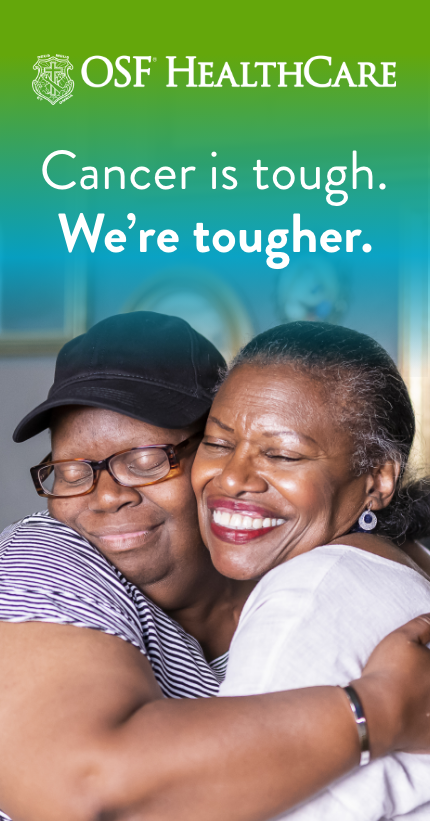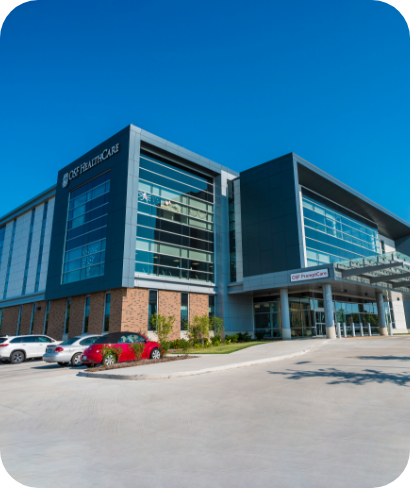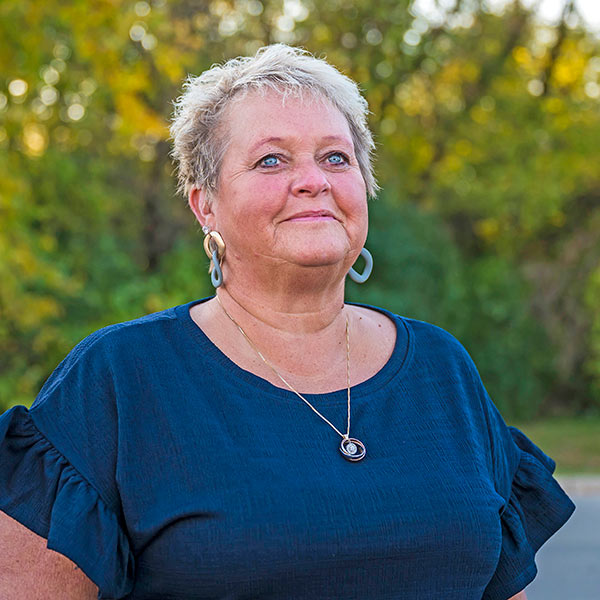

A cancer diagnosis changes everything.
Turn to what gives you strength – your family, friends, faith and the cancer experts at the OSF Cancer Center at OSF HealthCare St. Joseph Medical Center.
OSF is committed to serving the Bloomington community and beyond. Our cancer specialists collaborate to guide you through survivorship from diagnosis to treatment.
They’ll work with you to create a personalized care plan using the latest technology and the most advanced treatments to give you hope and promise throughout your cancer fight.
Get expert care near you
When it comes to cancer treatment, you don't need a one-size-fits-all approach to care. Your journey begins with your primary care provider, who can answer questions and connect you to the cancer care that’s right for you, right here in your community.
The teams at the OSF Cancer Center at OSF HealthCare St. Joseph Medical Center in Bloomington works with you and are by your side throughout your journey – from diagnosis through treatment to survivorship. Our programs and services are designed around you in an environment of compassion, care and concern for your total well-being.
From highly specialized treatments and technology to survivorship programs and rehabilitation, we're here to help you achieve the best possible outcomes.
Schedule an appointment with your primary care provider to get connected to the experts here to ensure you get the care you need.
Schedule an Appointment
Complete Cancer Care
We’re dedicated to not only providing you the best treatment, but the best quality of life. Our board-certified oncologists, nurses, patient navigators, social workers, pastoral care team and dietitians are focused on your physical, mental and spiritual needs throughout your journey.
Are You at Risk?
Your style of living, habits and family history can all play a role in your cancer risk. The first step to preventing cancer is understanding your risk.
Why Our Patients Choose Us

Bud
OSF HealthCare patient
When you think life has given up on you, don’t give up. Keep your faith.
View Bud's Story
Brandie
OSF HealthCare patient
Everybody has a purpose. Mine is my children. That's why it's personal.
View Brandie's StoryFrequently Asked Questions
OSF HealthCare offers a complete range of medical imaging and testing for detecting and treating cancer.
You have full access to these diagnostic capabilities, allowing for convenient access, faster exam times and results. These services include:
- 3D digital mammography
- Biopsy
- Bronchoscopy
- CT Scan – 64 slice, low-dosage
- Colonoscopy
- EGD
- Fluoroscopy
- Laryngoscopy
- MRI
- MRI – guided breast biopsy
- PET scan
- Ultrasound
The stage of a cancer indicates how much cancer there is and how far it has spread. The staging of a cancer is one of the most important things to know when deciding on treatment options.
Most cancers are staged and can have a value of 1, 2, 3 or 4. This is based on if the cancer is still contained in the area where it began, has started to spread into nearby tissues or organs or has spread to more distant tissues or organs (metastasized).
Stage 1 is the earliest stage. It usually means the cancer is still contained in the place it first started and hasn't spread. Stage 4 is the most advanced stage. In this stage, the cancer has spread from the primary site to other parts of the body.
Some cancers don’t have a staging system as it was found after it spread from an unknown primary site. In these instances, the cancer is at least a Stage 2.
Some cancer treatments, such as radiation, chemotherapy and biotherapy, have side effects. Side effects happen when the treatment, in trying to kill the cancer cells, kills healthy cells. Not everyone has side effects, and side effects depend on the type of cancer and treatment. Side effects usually go away when treatment ends.
Common side effects include:
- Blood problems
- Depression
- Fatigue
- Fever
- Hair loss
- Nausea
- Skin rash
- Vomiting
